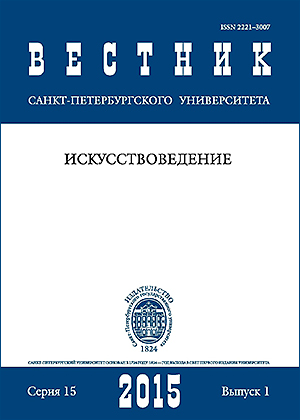Caricatures by brothers Nikolai and Sergei Legat. A study in interpretation
Abstract
The article sets forth a new view of the possibility of interpretation of graphic portraits-caricatures by Nikolai and Sergei Legat, published in 1903 as a complete album. The edition does not have any commentary by the authors, except for an autograph and surnames of the persons portrayed. The research applied the iconological method of analysis of works, a psychological approach to the perception and interpretation of images, and also engaged multiple autobiographical and critical publications for comparison and confirmation of the results of such a study in interpretation of graphic works. The article offered a visual and descriptive perception of caricature portraits of artists and ballet masters of the Imperial Mariinsky Theatre in Petersburg and performed the identification of those images with the descriptions given by contemporaries at the turn of 19th–20th centuries. Out of the total number of caricatures (95 pages) the article examined 12 people: Nikolai Legat, Sergei Legat, Marius Petipa, Maria Petipa, Pierina Legnani, Mathilde Kschessinska, Anna Pavlova, Agrippina Vaganova, Tamara Karsavina, Christian Johansson, Enrico Cecchetti, Mikhail Fokin. The selection of those names is determined by the principle of necessity and sufficiency in accordance with the popularity and significance of those figures of choreographic art for the Russian ballet, as well as their maximum artistic expressiveness. Through the example of the analysis of caricatures the article draws a conclusion about artistic peculiarities and merits of the works by the caricaturists, the brothers Nikolai and Sergei Legat.
Keywords:
caricature, Mariinsky Theatre, Saint Petersburg Theatre School, performance technique, “Italian” choreographic school, “Russian” Ballet School, stage persona, ballet pose, expressiveness of line, artistic image
Downloads
References
Downloads
Published
How to Cite
Issue
Section
License
Articles of "Vestnik of Saint Petersburg University. Arts" are open access distributed under the terms of the License Agreement with Saint Petersburg State University, which permits to the authors unrestricted distribution and self-archiving free of charge.






